Call centre speech analytics
There's so much valuable insight buried in each customer interaction, but the question is how to extract that information. That's where speech analytics comes in—and it comes built right into Dialpad's AI-powered customer engagement platform. Book a product tour to see how it works!
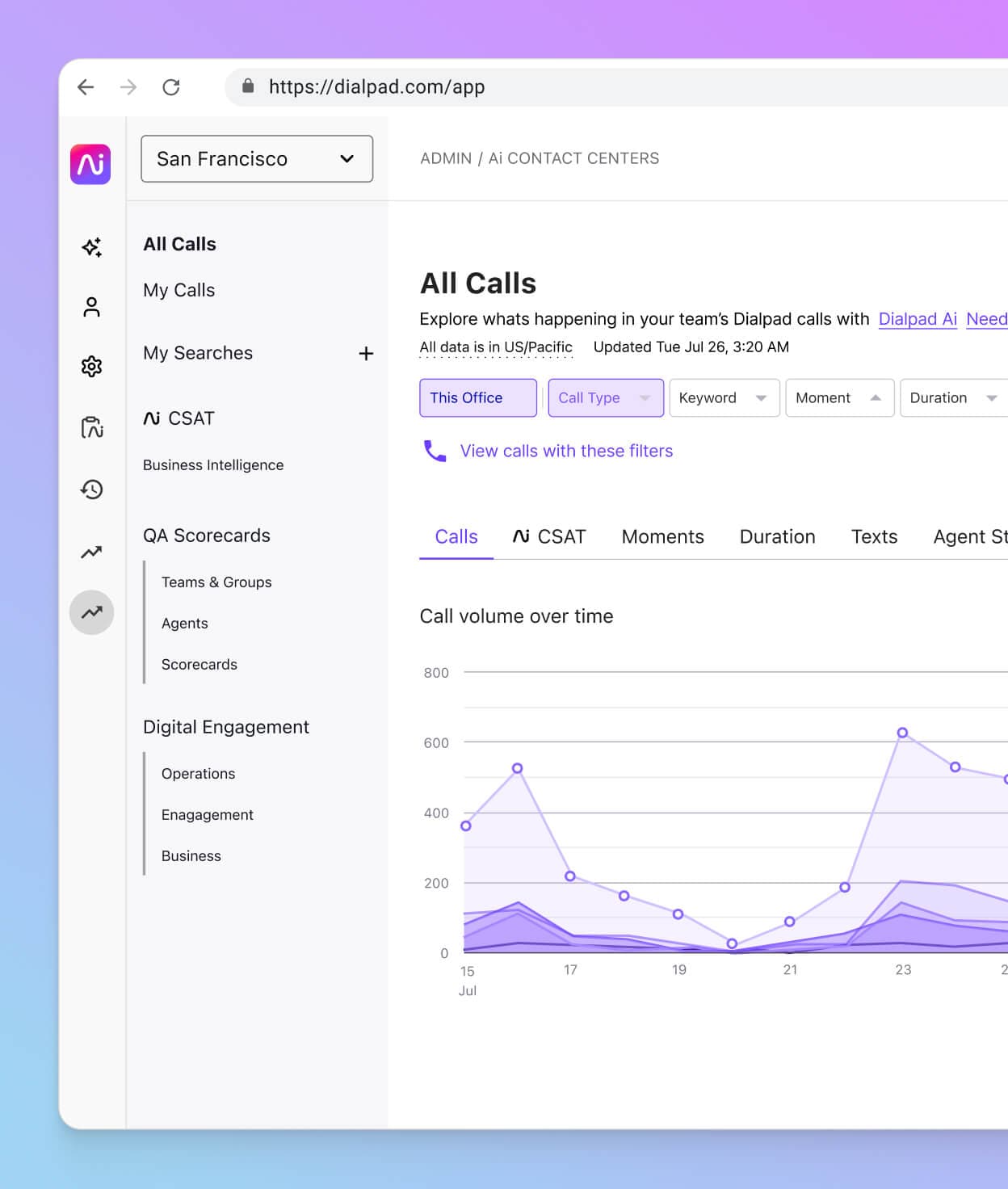
For most companies, getting useful business intelligence and insights that help them understand their customers better doesn’t require fancy surveys or outsourcing work to expensive research agencies.
They already have all the insights they need—in their customer calls. And their contact centre teams probably already have easy access to this information.
Traditionally, it would be through listening to call recordings one by one and taking notes, which, as you can imagine, is pretty time-consuming and labour-intensive.
Good news is, call centres and contact centres don’t have to do that anymore thanks to call centre speech analytics software and, specifically, AI-powered speech analytics.
But what exactly is speech analytics? How does speech analytics for call centres work? And how can it help call and contact centres improve operational efficiency?
What is speech analytics and how does it work?
So, what is speech analytics? As its name suggests, speech analytics is the process of analysing and extracting data and insights from conversations that your business has—usually on the phone, and usually with customers and prospects.
AI speech analytics is the use of artificial intelligence technology to gather and parse this data automatically. It’s the advent of AI technology to help with the process that makes speech analytics more accessible to a wider range of businesses. You could do it without AI, but it would take more time and resources than most organisations would be prepared to spend.
Speech analytics vs. voice analytics
To fully understand how speech analytics works, it’s also important to differentiate it from some other similar concepts and processes. Most notably, voice analytics.
AI voice analytics and speech analytics are very similar. They both involve analysing conversations—usually, with customers—in order to extract actionable insights. However, precisely what you’re analysing differs.
Speech analytics works by digging into and assessing what’s been said in the analysed conversations. So, examples of speech analytics insights may include the discovery that lots of customers ask agents about a particular feature of a product.
Voice analytics, on the other hand, considers how things are said. It analyses things like the tone, speed, and pitch of speech. AI technology can then take that information to infer things like the sentiment of the speaker.
So, speech analytics features tell you what customers are talking about, and voice analytics suggests how they feel about it.
Speech analytics vs. text analytics
Text analytics is another closely related concept. In fact, it’s very similar to speech analytics—all that differs is the communication channels to which it refers.
Where speech analytics deals with spoken conversations over the phone, text analytics refers to deriving the same insights from written interactions—think, live chat, text messages, and emails.
What call and contact centres can do with Dialpad's speech analytics & broader conversation intelligence
Dialpad’s AI-powered customer engagement platform helps users harness the power of conversation intelligence. Here are just a few examples of what you could achieve:
Spot problem areas more easily
Are certain competitors coming up in conversations more? Maybe you’re interested in reasons why customers call to ask for refunds. You can program these words and phrases into Dialpad to track how often they come up in conversations—and provide a better customer experience.
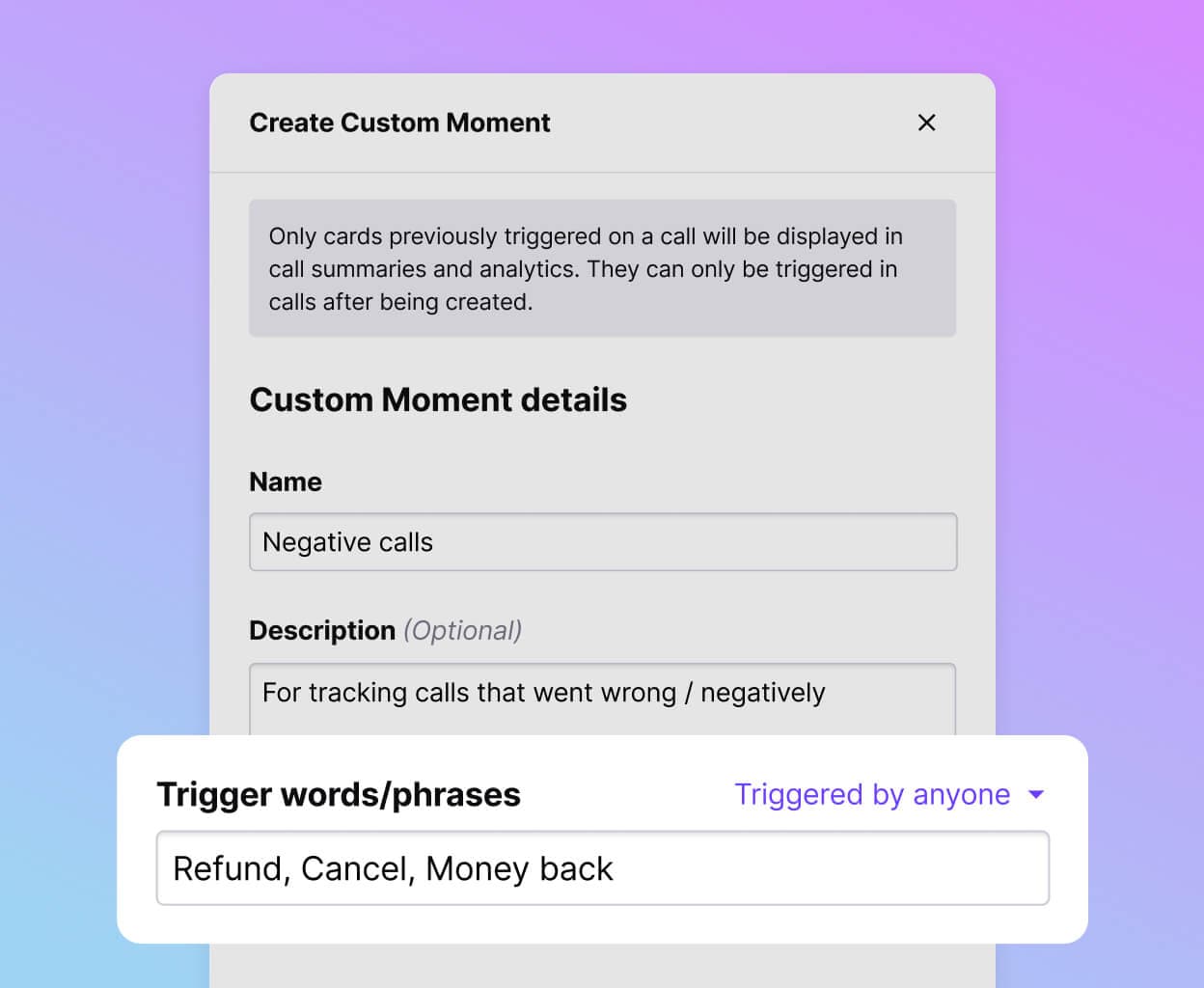
Reduce churn
Retaining customers is important for every business. What if you could anticipate issues better and solve issues before customers leave you? A speech analytics tool like Dialpad can help you pick out these issues more quickly. Create Custom Moments to track how often terms like “money back” or “cancel” or “refund” comes up on customer conversations.
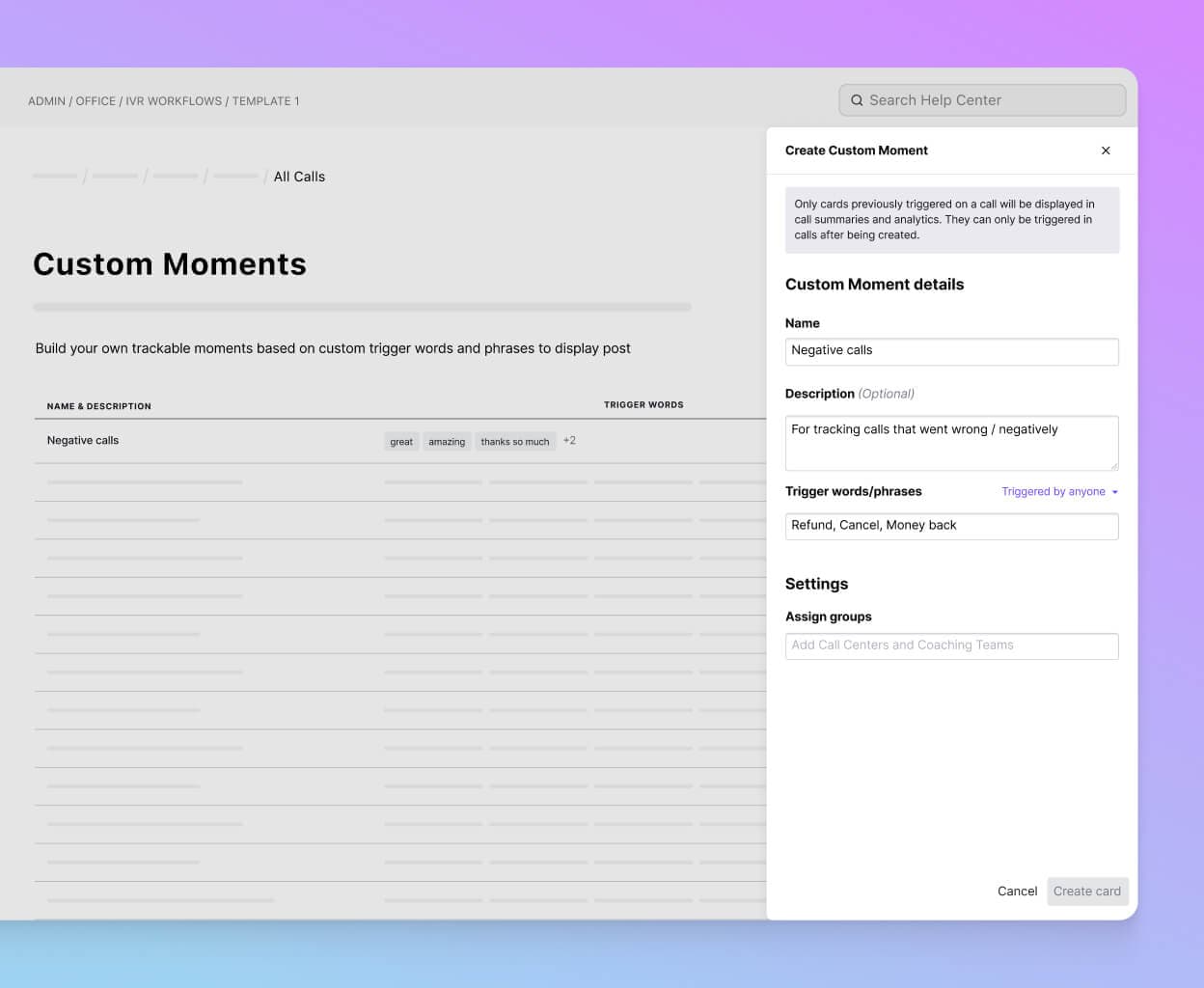
Coach agents at scale
What if an agent needs assistance during a phone call? With Dialpad, call centre managers and supervisors can see a live sentiment analysis for each call, read real-time transcripts of phone calls their agents are on, and message them on the side with advice.
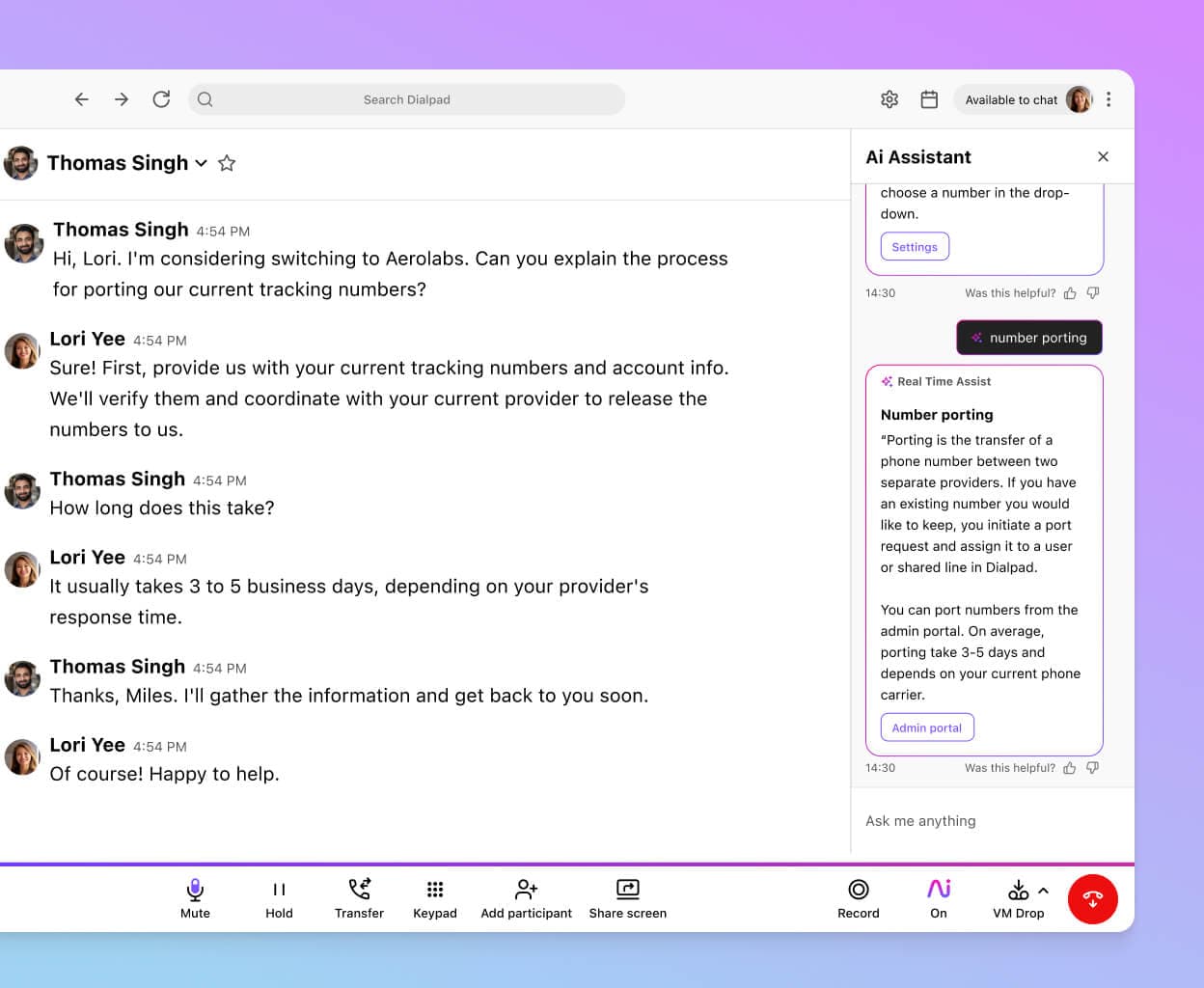
Provide a great customer experience while reducing costs
Use customer insights from your calls to improve your quality assurance and quality monitoring efforts, reduce the number of repeat calls—and ultimately, improve customer satisfaction—at a lower cost. (In general, the cost of speech analytics tools is often paid for when compared to the positive impact they can have on the customer experience.)

Easily identify and address compliance issues
Compliance is a top priority for contact centres and call centres in quite a few industries. As well as adhering to legislation like the Payment Card Industry Data Security Standard (PCI-DSS) and Healthcare Insurance Portability and Accountability Act (HIPAA), you also need to adhere to the requirement in many states that customers must give consent for a call to be recorded. Along with Dialpad's speech analytics, you can also build custom APIs to automatically identify compliance issues in customer engagements.
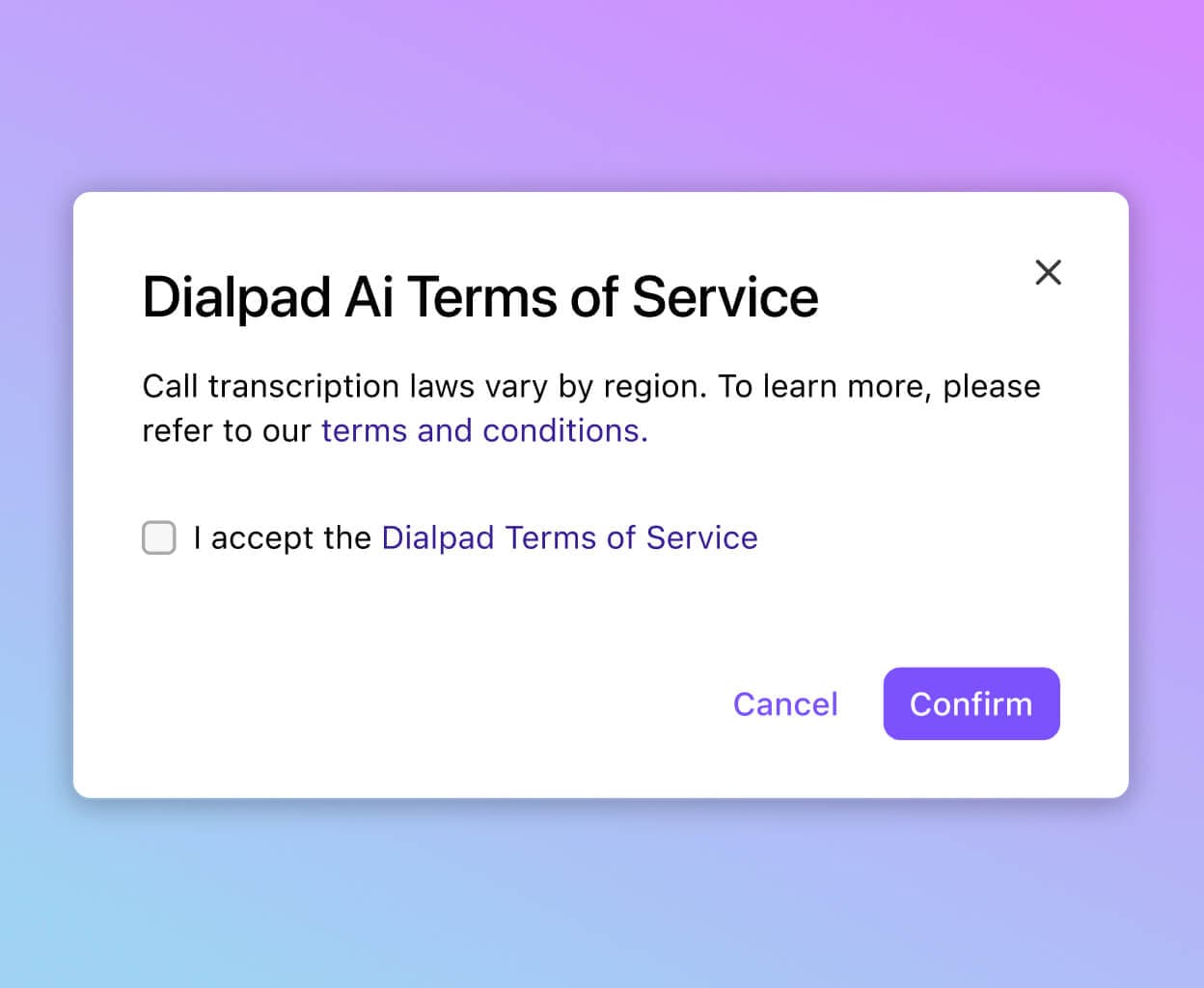
Common speech analytics software use cases
Speech analytics solutions are used by forward-thinking businesses across a range of different areas. Here are just three examples of the most common applications of speech analytics tools:
Directly improving customer service
Both voice and speech analytics technology can help to improve customer service, in real-time.
Take Dialpad Ai, for instance, which is built into Dialpad’s customer engagement platform. It can automatically provide agents with hints and helpful information based on what a caller says. What’s more, sentiment analysis can also show a call centre supervisor if a call is going badly.
In combination, those features make it easier for your call centre to improve the service provided to the caller.
Onboarding and training agents
Contact centres often have a high turnover rate, and constantly training new staff costs time and money.
Call centre speech analytics software can not only improve training during onboarding but also help with ongoing coaching as new issues and questions come up.
For example, you might use speech analytics to identify calls which cover certain topics or issues. With Dialpad, you can then combine these calls into playlists to aid onboarding and training.
Better informing marketing efforts
With data you can get from the best speech analytics software, you should be able to identify trends in customer interactions, behaviours, and desires. Those insights can help with optimising your marketing strategy and ensuring it’s tailored directly to your customers.
Business benefits of speech analytics
We’ve covered the what and the how of speech analytics, but what about the why? Why might you want to implement it in your call or contact centre? Here are some of the principal speech analytics benefits your business could reap:
Greater customer satisfaction
By leveraging AI-powered speech analytics, you can better serve the customers who reach out to your call centre.
Real-time agent assists and the other similar features we’ve already mentioned will help you resolve queries more efficiently and, thus, more quickly. What that’s likely to lead to is greater customer satisfaction.
Enhanced agent productivity and engagement
Supporting your agents with speech analytics tools isn’t only good news for your customers. It’s a real boost for your agents, too.
When they have the tools at their disposal to better serve customers, agents will be more productive. They’ll be able to handle a greater volume of calls. There’ll also be fewer difficult—potentially bad-tempered—calls each shift. A fact that will boost agent satisfaction and engagement.
Streamlined and consistent call centre workflows
Speech analytics, twinned with wider-ranging contact centre analytics, can also help you improve efficiency and productivity across your centre.
The more data and information you have, after all, the more accurately you can assess your current workflows and processes. The easier it is, too, to pinpoint any problems with them. Problems which you can then solve to make things more streamlined and efficient across the board.
Start harnessing AI-driven speech analytics with Dialpad
You may already have a team of great agents working in your contact centre or call centre, but with a good speech analytics tool, you can turn those great agents into super agents.
By analysing the conversations between customers and agents, either in real-time or later as call recordings or transcriptions, you can adjust your tactics to improve your contact centre performance.
👉 Dialpad tip:
Dialpad's built-in artificial intelligence technology can determine keywords that are associated with positive and negative sentiment—including if a customer is angry or if an agent is struggling with a call.
Interested in speech analytics?
From helping you improve your FAQ self-service knowledge base to finding new ways to provide the best customer experience possible, the uses are endless. Get a demo of Dialpad to see how it can work for your agents, or take a self-guided interactive tour of the app!








